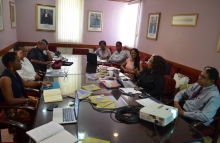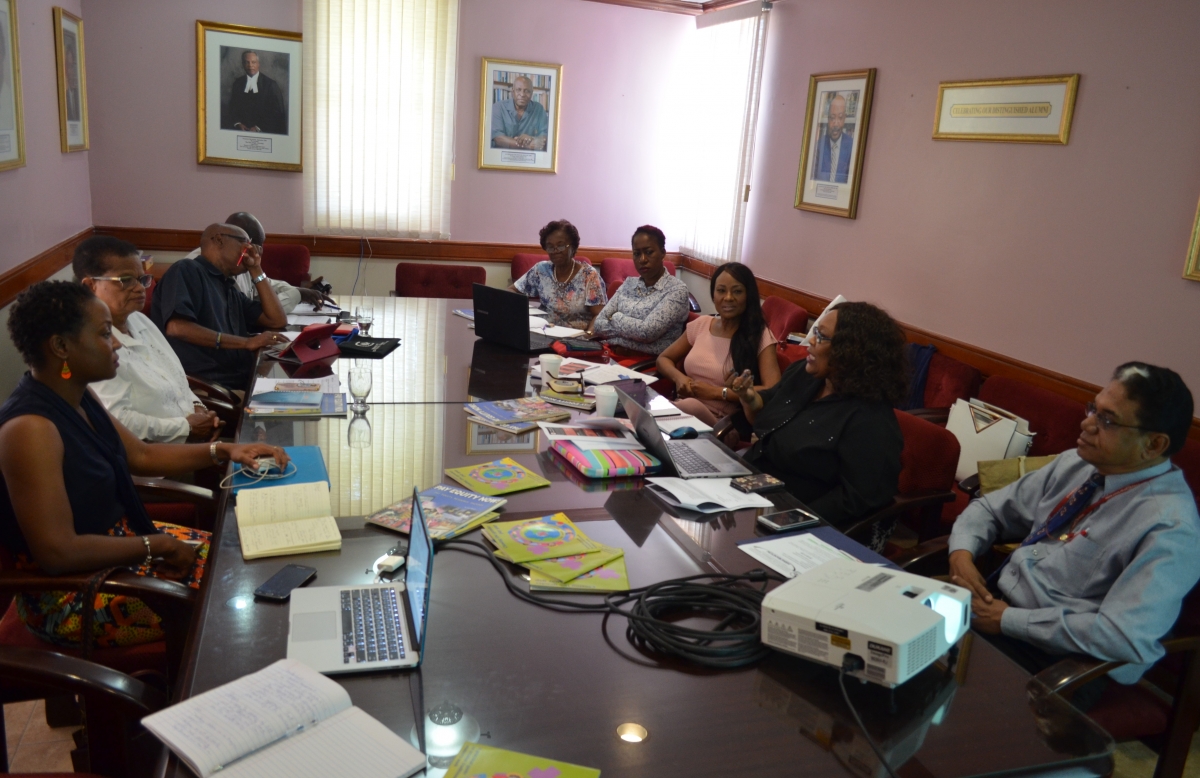Barbados: Pilot study on gender–based violence in the Public Sector


Stakeholders' meeting on Barbados pilot study on GBV@Work
The Congress of Trade Unions and Staff Associations of Barbados (CTUSAB) and the National Union of Public Workers (NUPW) met recently to discuss and plan for a pilot study on gender-based violence in the public service. The pilot study will focus on the health and social services sector and will be carried out in partnership with the Institute for Gender and Development Studies: Nita Barrow Unit (NBU) of the University of the West Indies. The NBU is located at the Cave Hill Campus in Barbados.
This research is part of a wider body of research planned to examine GBV@Work. In developing the proposals, the PSI and the NBU noted:
- There have been no comprehensive research studies which seek to examine how gender-based violence affects workers at work as well as the experiences of gender-based violence in the workplace itself in the Caribbean
- Only three Caribbean countries - Barbados, Belize and the Bahamas - have specific legislation which addresses sexual harassment;
- Prevalence rates for intimate partner violence range from 20-69% for the Caribbean;
- All Caribbean countries have a higher rate of rape than the world average;
- Michelle Rowley, in her research on the Royal Barbados Police Force, named sexual harassment as “a potential backlash effect” of mainstreaming women into “atypical professions”;
- Discrimination and persecution on the grounds of sexual orientation and gender identity are central to multiple petitions for asylum by Caribbean people in Canada and elsewhere in the global North.
At a recent stakeholders’ meeting, Dr Tonya Haynes, lecturer at the NBU, explained,
“Through the findings of the research, we want to provide key conceptual and empirical insights into the problem of gender-based violence at work. Trade unions can then use the practical results from the research.”
The research will use an adapted version of the TUC survey on sexual harassment at work, revised to include homophobic and transphobic harassment. There will be sector-specific, in-depth qualitative interviews with employers, trade union leaders and workers.
In outlining the specifics of the study, Dr Halimah DeShong stated,
“Our target sectors are health care workers and workers in social care, in particular home help workers. We will work with our graduate students over the summer holidays and we look forward to your help and engagement in the work.”
Joannah Waterman, president of the Barbados Nurses Association, lauded the focus on the health sector, saying,
“The health sector is a mission critical profession or mission critical sector. We interact and interface with every single sector and every single type of individual in the community.”
The pilot will also gather information on the structural conditions of work, including gender-neutral job evaluations, gender segregation in the Barbados labour market; trade union and employer policies and responses to GBV at work; and the types of violence experienced by workers in the target sector.
Interviews will commence in late August. There will be a dissemination workshop in November.
Background
Barbados has ratified key international and regional human rights instruments related to gender equality, namely the Convention on the Elimination of All Forms of Discrimination Against Women (CEDAW) and the Inter-American Convention on the Prevention, Punishment and Eradication of Violence against Women. It has also ratified the eight core International Labour Organization (ILO) Conventions.
In 2016, there were amendments to the domestic violence laws providing for more powers to the police as well as a recognition of marital rape.
In December 2017, the Employment Sexual Harassment (Prevention) Act 2017 was proclaimed.
You may also be interested in:
Country Gender Assessment (CGA), Barbados, Caribbean Development Bank (CDB), January 2016
Employment Sexual Harassment (Prevention) Act, Barbados
Welcome change to domestic violence laws – Editorial in the Barbados Advocate, January 28, 2016
Domestic Violence Protection Orders Act Strengthened – Article in Barbados Advocate, April 19. 2018

